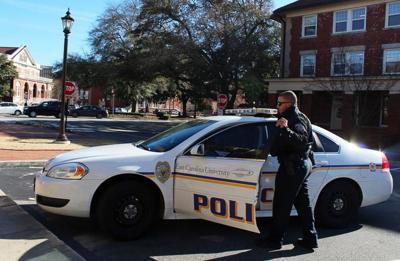East Carolina University is searching for ways to educate its students on the topic of drug use as new drug findings are surfacing and marijuana continues to be the most common drug found on college campuses nationally.
Jason Sugg, deputy chief of ECU Police Department (ECU PD), said marijuana is the most common drug found on campus but drugs aren’t found on campus daily. ECU PD does get more calls about drug use on the weekends, he said.
Sugg said drugs can be found on campus when drug activity is reported. Drugs can additionally be found when ECU PD finds them when someone is pulled over on the side of the road on campus or in surrounding areas, he said.
It is not “unusual” to find prescription drugs on campus such as Xanax and Adderall, Sugg said.
ECU PD may find drugs when they pull someone over for speeding and find drugs in their car, Sugg said.
“A lot of the folks we end up interacting with in these situations are not ECU students. Some of them are, but some of them aren’t,” Sugg said.
If a student gets involved with simple position, which is a lower misdemeanor charge, ECU has programs in place to help them not impact their future, Sugg said. These programs are acknowledged by the court system and are the same programs the courts offer when someone has a drug charge, he said.
“If it’s a felony versus a misdemeanor or someone is charged with a felony with intent to sell, as opposed to just possessing it, so all of these factors will play into how someone’s criminal case or someones administrative sanctions through the university will play out,” Sugg said.
Director of the Office of Student Rights and Responsibilities (OSRR) Leila Faranesh gave a presentation about drug use on East Carolina University’s campus at the Sept. 12 Board of Trustees meeting.
In North Carolina, drugs are ranked by schedules. There are six substance schedules at ECU, Faranesh said. Schedule one, four, and six were the most common offenses on ECU’s campus, she said. Schedule one substances include opiates, opium, derivatives, hallucinogenic substances, depressants and stimulants, she said.
Schedule four substances include depressants, stimulants, fenfluramine, pentazocine and limited narcotic drugs, Faranesh said. Schedule six substances include cannabis and cannabis derivatives, according to Faranesh. Schedule two is sometimes seen at ECU which is adderall, ritalin, cocaine and fentanyl.
A drug’s schedules is determined on the addiction factor and rate of danger, Faranesh said.
“The lowest schedule, the more dangerous the drug, for instance, a schedule one drug has no medicinal use or purpose, and it is our heroin, LSD, ecstasy, we see very few of these. Our schedule six is marijuana, that's where we see most of our drugs,” Faranesh said.
In the 2018-19 school year, there were 296 findings of drugs, drug paraphernalia and other controlled substances reported to OSRR and only 214 of these findings was responsibility for drug use proven, Faranesh said.
There are administrative sanctions and educational sanctions for drug charges, Faranesh said. The minimum penalty for drug charges is probation for one month. The university does not like to exceed one or two years for a minimum penalty because it is a “strong warning,” Faranesh said. Students can receive probation multiple times, she said.
Someone can receive six semesters of suspension if they are found to have 150 grams or more of marijuana, Faranesh said.
SGA President Colin Johnson said after someone has been suspended for six semesters their environment on campus is different as they develop new contacts.
“Suspension of six semesters, when you come back to campus after that, it's a whole new connection, those contacts who may have gotten you in trouble are no longer there,” Johnson said.
The deferred suspension is a new sanction at ECU for drugs, Faranesh said. The deferred suspension allows those accused to stay enrolled in the university as a student unless they violate the Student Code of Conduct which would result in a suspension, she said.
BOT member Max Joyner raised concerns about deferred suspension for students accused of underage drinking. Faranesh said this only happens if a student has multiple underage drinking offenses. For a first time underage drinking offense students get a warning, she said.
“If we were giving young people underage tickets or suspensions, we wouldn’t have a whole lot of people on campus,” Vice Chancellor of Student Affairs Virginia Hardy said.
Some people have been banned from campus under an administrative suspension which is an immediate ban from ECU, Faranesh said. This is only for the most severe cases in which the student is a threat to ECU. She said there are very few of those each year.
Expulsion is when someone is banned from any UNC School. After five years the student can petition the chancellor to have the charge reduced to a suspension, Faranesh said.
“We are always looking to improve the way we manage drug cases because every year there's some new drug that we see that we don’t know about and we’re always looking at ways to offer students more education on drugs,” Faranesh said.







(0) comments
Welcome to the discussion.
Log In
Keep it Clean. Please avoid obscene, vulgar, lewd, racist or sexually-oriented language.
PLEASE TURN OFF YOUR CAPS LOCK.
Don't Threaten. Threats of harming another person will not be tolerated.
Be Truthful. Don't knowingly lie about anyone or anything.
Be Nice. No racism, sexism or any sort of -ism that is degrading to another person.
Be Proactive. Use the 'Report' link on each comment to let us know of abusive posts.
Share with Us. We'd love to hear eyewitness accounts, the history behind an article.